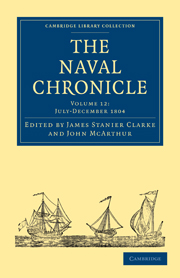 The Naval Chronicle
The Naval Chronicle Book contents
- Frontmatter
- PREFACE TO THE TWELFTH VOLUME
- PLATES IN VOLUME XII. From Original Designs
- BIOGRAPHICAL MEMOIR OF SIR ISAAC COFFIN, BART. REAR-ADMIRAL OF THE WHITE SQUADRON
- BIOGRAPHICAL MEMOIR OF THE HON. GEORGE CRANFIELD BERKELEY, REAR-ADMIRAL OF THE RED SQUADRON
- BIOGRAPHICAL MEMOIR OF SIR PETER PARKER, BART. ADMIRAL OF THE FLEET
- BIOGRAPHICAL MEMOIR OF THE LATE SIR PETER WARREN, K.B. VICE-ADMIRAL OF THE RED SQUADRON
- BIOGRAPHICAL MEMOIR OF SIR NATHANIEL DANCE, KNT. Commander of the Honourable East India Company's Ship Earl Camden, and Commodore of their Fleet homeward-bound from China
- BIOGRAPHICAL MEMOIR OF SIR RICHARD KING, BART. ADMIRAL OF THE WHITE SQUADRON
- INDEX
BIOGRAPHICAL MEMOIR OF THE HON. GEORGE CRANFIELD BERKELEY, REAR-ADMIRAL OF THE RED SQUADRON
Published online by Cambridge University Press: 10 January 2011
- Frontmatter
- PREFACE TO THE TWELFTH VOLUME
- PLATES IN VOLUME XII. From Original Designs
- BIOGRAPHICAL MEMOIR OF SIR ISAAC COFFIN, BART. REAR-ADMIRAL OF THE WHITE SQUADRON
- BIOGRAPHICAL MEMOIR OF THE HON. GEORGE CRANFIELD BERKELEY, REAR-ADMIRAL OF THE RED SQUADRON
- BIOGRAPHICAL MEMOIR OF SIR PETER PARKER, BART. ADMIRAL OF THE FLEET
- BIOGRAPHICAL MEMOIR OF THE LATE SIR PETER WARREN, K.B. VICE-ADMIRAL OF THE RED SQUADRON
- BIOGRAPHICAL MEMOIR OF SIR NATHANIEL DANCE, KNT. Commander of the Honourable East India Company's Ship Earl Camden, and Commodore of their Fleet homeward-bound from China
- BIOGRAPHICAL MEMOIR OF SIR RICHARD KING, BART. ADMIRAL OF THE WHITE SQUADRON
- INDEX
Summary
“———I wish no other herald,
No other speaker of my living actions,
To keep mine honour from corruption,
But such an honest chronicler.”
Shakespeare.The Honourable George Cranfield Berkeley is son to the late, and brother to the present Earl of Berkeley. The family is ancient; and, as will be sufficiently evident from the following account, of honourable origin:–
According to the custom of those times, when the English, in imitation of the Normans, began to assume their surnames from the place of their residence, this of Berkeley was then given to one Roger de Berkley, in the time of William the Conqueror, whose descendants did enjoy the same for some time; but the male line of that noble family ceasing, we are to observe that Robert Fitz Harding (a powerful man in his time) obtaining a grant of the castle and honour of the Berkeley from Henry, son of Maud the Empress, possessed himself thereof; whereupon his descendants assumed the surname, which, together with the castle and barony, continues to them in the male line to this day; of which Robert, I am to take notice, that his father is said to have been the youngest son to one of the kings of Denmark; or, as others affirm (which differs but little), to be descended from the royal line of those kings, and that accompanying Duke William of Normandy, in that signal expedition he made into England, was present with him in the memorable battle where king Harold was slain.
- Type
- Chapter
- Information
- The Naval ChronicleContaining a General and Biographical History of the Royal Navy of the United Kingdom with a Variety of Original Papers on Nautical Subjects, pp. 89 - 168Publisher: Cambridge University PressPrint publication year: 2010First published in: 1805


